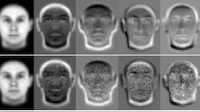
Principal Component Analysis (PCA) has been widely used for the representation of shape, appearance, and motion. One drawback of typical PCA methods is that they are least squares estimation techniques and hence fail to account for “outliers” which are common in realistic training sets. In computer vision applications, outliers typically occur within a sample (image) due to pixels that are corrupted by noise, alignment errors, or occlusion. We review previous approaches for making PCA robust to outliers and present a new method that uses an intra-sample outlier process to account for pixel outliers. We develop the theory of Robust Principal Component Analysis (RPCA) and describe a robust M-estimation algorithm for learning linear multivariate representations of high dimensional data such as images. Quantitative comparisons with traditional PCA and previous robust algorithms illustrate the benefits of RPCA when outliers are present. Details of the algorithm are described and a software implementation is being made publicly available.
| Author(s): | De la Torre, F. and Black, M. J. |
| Book Title: | Int. Conf. on Computer Vision, ICCV-2001 |
| Volume: | II |
| Pages: | 362-369 |
| Year: | 2001 |
| Project(s): | |
| Bibtex Type: | Conference Paper (inproceedings) |
| Address: | Vancouver, BC, USA |
| Electronic Archiving: | grant_archive |
| Links: | |
BibTex
@inproceedings{Torre:ICCV:2001,
title = {Robust principal component analysis for computer vision},
booktitle = {Int. Conf. on Computer Vision, ICCV-2001},
abstract = {Principal Component Analysis (PCA) has been widely used for the representation of shape, appearance, and motion. One drawback of typical PCA methods is that they are least squares estimation techniques and hence fail to account for “outliers” which are common in realistic training sets. In computer vision applications, outliers typically occur within a sample (image) due to pixels that are corrupted by noise, alignment errors, or occlusion. We review previous approaches for making PCA robust to outliers and present a new method that uses an intra-sample outlier process to account for pixel outliers. We develop the theory of Robust Principal Component Analysis (RPCA) and describe a robust M-estimation algorithm for learning linear multivariate representations of high dimensional data such as images. Quantitative comparisons with traditional PCA and previous robust algorithms illustrate the benefits of RPCA when outliers are present. Details of the algorithm are described and a software implementation is being made publicly available.},
volume = {II},
pages = {362-369},
address = {Vancouver, BC, USA},
year = {2001},
slug = {torre-iccv-2001},
author = {De la Torre, F. and Black, M. J.}
}
